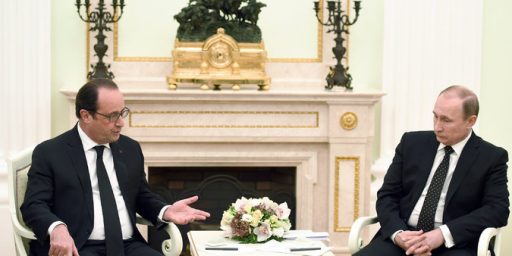François Hollande Elected President Of France
As most observers had been expecting, François Hollande was elected the 9th President of the French Fifth Republic in a runoff with incumbent President Nicolas Sakorzy:
François Hollande swept into office on Sunday, becoming the first Socialist to become president of France since François Mitterrand left office in 1995. Mr. Hollande campaigned on a kinder, gentler, more inclusive France, but his victory over Nicolas Sarkozy will also be seen as a challenge to the German-dominated policy of economic austerity in the euro zone, which is suffering from recession and record unemployment.
French voters may not like belt-tightening, but both Mr. Hollande and Mr. Sarkozy had promised to balance the budget in the next five years. The vote was viewed domestically as a rejection of the unpopular Mr. Sarkozy and his relentless effort to appeal to the voters of the far right National Front. Mr. Sarkozy is the first incumbent president to lose since Valéry Giscard d’Estaing lost to Mr. Mitterrand in 1981.
With about half the votes counted, preliminary results released by the Interior Ministry shortly after the last polling stations closed at 8 p.m. showed Mr. Hollande had secured about 51 percent of the vote while Mr. Sarkozy, of the center-right Union for a Popular Movement, had about 49 percent. Opinion pollsters suggested that the final result would be closer to 52 percent versus 48 percent.
“François Hollande is the president of the republic, he must be respected,” Mr. Sarkozy said in a gracious concession speech shortly after the polls closed. “I want to wish him good luck in the midst of these tests.”
Mr. Sarkozy thanked “the millions of French who voted for me,” but said he accepted “total responsibility” for Sunday’s result.
“My involvement in the life of my country will be different now,” Mr. Sarkozy said. “But time will never weaken the ties between us.”
Speaking earlier to party members, Mr. Sarkozy, who campaigned energetically to the end, told them to “remain united” and not give in to division. He said he would not lead the party into June’s legislative elections but said “they are winnable.”
Mr. Sarkozy said: “I become a citizen among you.”
The election in France and the parliamentary election in Greece on Sunday have been closely watched in European capitals and particularly in Berlin, where Chancellor Angela Merkel has led the drive to cure the euro zone debt and banking crisis with deep budget cuts and caps on future spending.
Mr. Hollande will make an early visit to Berlin, but Ms. Merkel herself on Sunday was also watching results of state elections in Schleswig-Holstein, where exit polls indicated that her party was losing a fight to hold on to the state Parliament. With another election coming May 13 in North Rhine-Westphalia, Ms. Merkel is not viewed as having much room domestically to compromise on crucial issues of inflation and debt limits.
Mr. Sarkozy is only the latest of a string of European incumbents, from both left and right, to lose elections in a larger popular revolt against budget-cutting and tax rises in a time of recession and high unemployment. The race between economic adjustment to reduce debt and democratic anger is proving complicated for Europeans, and Mr. Hollande has said he intends to give “a new direction to Europe,” demanding that a European Union treaty limiting debt be expanded to include measures to produce economic growth.
“How Hollande handles Merkel could make or break his prospects for the next five years,” said François Heisbourg of the Foundation for Strategic Research in Paris. “He has favorable circumstances, but she has domestic politics too,” and she is seen as likely to agree to only symbolic changes in the fiscal pact — not renegotiating it so much as adding clauses about growth to it.
Of course, there has been talk about renegotiating the Europe’s agreements before and they’ve largely come to naught. The real question is whether this, along with today’s developments in Greece, will lead to another round of market panic over the future of the Eurozone because, in the end, Hollande is going to have to deal with the same economic realities that Sarkozy and Merkel have been dealing with, and there’s very little room to maneuver when the options are so limited.






Addendum: Slate – Europe’s far right is the true winner of France’s presidential election
Hollande can attempt do what Sarkozy refused to consider, and is the only solution to
France’s economic problems: leave the eurozone, replace the euros with francs and let the currency float. The commitment of EMU leaders to neo-liberal economic balderdash is the problem, not some unavoidable law of the universe which requires the people of France suffer.
@Ben Wolf:
Sure seems like Spain could use a dose of the same medicine. Austerity has been a catastrophe for Spain.
And Spain’s problems did not arise from government overspending. They are the result of a real estate bubble that makes the U.S.’s look like a day at the beach.
@Pug: Yeah, a fact austerity fetishists consistently leave out is Spain ‘s government was running surpluses prior to the financial crisis. So how can the same “crisis of confidence” we’re told cratered the Greek economy also have undermined Spain’s?